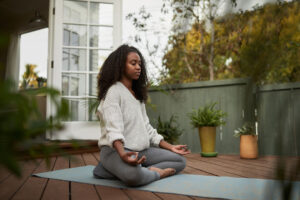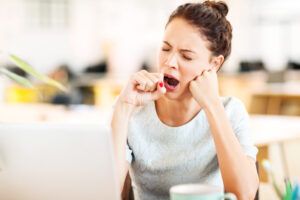I’ll sleep when I’m dead.” Is this your motto? Acknowledging your attitude toward sleep and your state of sleep deprivation is an essential first step to a healthy lifestyle.
Our culture and society have seemingly convinced us to deny the very real human need for sleep.
Students stay up late studying or doing projects.
Workers skip sleep to meet deadlines.
Medical practitioners live with shift work schedules and 24 workdays.
Partygoers develop poor sleep habits and risk serious problems from sleep deprivation.
And, new parents must live the baby’s sleep schedule.
Do you see yourself here? Keep reading to find out how much sleep you need for your body to function at its optimal level.
How much sleep do you really need
How much sleep a person needs varies. An adult should sleep 7 to 9 hours a night, while kids need 10 to 12 hours a night. The point is to get adequate sleep so you can wake up rested. And if stress and poor sleeping habits are keeping you from that, you may start to see some odd behaviors and health conditions pop up.
Dr. Harold L. Williams and associates at the Walter Reed Army Institute of Research found the mental symptoms and effects of sleep deprivation develop gradually over time. At first, they may go unnoticed but become quite profound. These include mental, emotional, and physical disturbances such as:
- Progressive deterioration of mental functioning
- Reduction of attention span
- Weariness
- Fatigue
- Feelings of isolation
After ninety hours of sleep deprivation, one develops vivid hallucinations and may end up in psychosis.
Our reliance on technology creates the conditions for sleep deprivation.
Technology is highly stimulating — looking at a monitor, answering e-mails, mental problem solving, playing on the Xbox, or watching highly dramatic, exciting TV. The body responds as if you are in the action yourself. Your heart rate and metabolism increase and your mind races to keep up. Once you’re over-stimulated it is difficult to calm down and fall asleep.
It is important to be the master of your technology. Take unneeded technology, like the TV and phone, out of your bedroom. Be sure the glow from the radio or clock isn’t too bright for sleep. Recent research on lighting indicates blue light disrupts the melatonin sleep cycle. A simple solution for too bright tech is to put something in front of the LED bulb.
Children have different sleep needs than adults and react differently to sleep deprivation. Sleep-deprived children display hyperactivity and may develop attention deficit disorder. There may be emotional outbursts such as aggression or crying, and inappropriate behaviors at school. Achievement may suffer. Although a child might need a simple nightlight, avoid lighted pillows or other lighted toys that might interrupt sleep.
Signs of sleep deprivation
- Stress — causes you to crack and fold, have difficulty solving problems, and feel helpless.
- Memory Loss — can’t recollect anything specific in your mind, memories are vague or hazy.
- Poor Concentration — an inability to focus on anything you’re doing, reaction time is significantly slowed. This serious effect can impact everything you do.
- Appetite Changes–you will be super hungry all the time or have no appetite at all. Prolonged sleep deprivation may cause either weight gain or loss.
- Irritability — a growing anger and near hatred of everything and everyone.
- Tiredness — characterized by feeling that any task is overwhelming.
- Feeling or being socially inept — you cannot communicate effectively and the things people say are incomprehensible to you.
The body recharges and repairs itself during sleep. Vigorous and demanding exercise requires plenty of sleep for the body to recharge to its optimum. If you have sleep deprivation, the body cannot recharge itself, and total exhaustion sets in.
Melatonin is the key sleep hormone. Sunset triggers heightened melatonin secretion from the pineal gland. As reported in the journal Sleep Medicine, melatonin supplements may be of use for certain insomniacs, and to regulate circadian rhythm sleep disorders. Research has shown melatonin supplements taken at the same time each night improve the ability to fall asleep.
Lifestyle tips to improve sleep quality
- Avoid alcohol, tobacco and caffeine.
- Eat light meals more often throughout the day. Do not eat within two or three hours of going to bed.
- Try to go to bed at an early hour so that you spend more time in a relaxed state. According to Ayurveda and research, it is easiest to fall asleep and the quality of rest is deeper if we go to bed before 10 p.m.
- Avoid stimulating activities like intense conversation or watching an exciting movie after 10 PM, or you may find sleep eludes you or you wake feeling depleted.
- Make sure your room is perfectly dark. Reduce noise levels to the absolute minimum.
- Meditate for 15 minutes or so before going to bed and your mind will be quieter and your sleep more restful.
- Go to bed only when you feel drowsy as this short circuits anxiety about the arrival of sleep, which is a major cause of sleeplessness.
- Drink lots of water throughout the day, to flush out toxins and help support the kidneys. But minimize water intake after 6 pm to avoid sleep disturbance.
- Try an oil massage. Oil massage is an effective way to destress and relax. The oil massage encourages toxin elimination, lubricates joints, improves complexion, relieves fatigue and increases energy levels. Recommended oils are sesame (some find it a bit hot), coconut, and Egyptian. Warm the oil bottle a bit in a wide bottom dish of water. Massage the oil all over your body. Rest for at least 30 minutes then have a warm shower.
- Get regular exercise. Daily exercise increases alertness and raises body temperature. So stop exercise five to six hours before bedtime for refreshing sleep.
Quick fixes for insomnia and sleepless nights
- If you don’t fall asleep within half an hour of going to bed, get up and meditate or read a book.
- If you awake in the middle of the night don’t fret or fight to get sleep.
- If you worry about sleep onset, listen to calm, soothing music or audiobooks to distract yourself. Insomniacs often find it hard to fall asleep because they think too much about falling asleep.
- Ensure the bedroom you sleep in is peaceful with adequate ventilation
- Two drops of sesame/castor oil applied to your foot will make you sleepy
- Soak your feet in warm water for ten minutes before retiring
- Take deep breaths–breathe in, imagine happiness and positive energy, and breathe out exhaling stress, worries and tension.
- Get out of bed when you’re not sleeping.
- Use your bed and bedroom only for sleeping or sex.
- Limit a nap to no more than 30 minutes and don’t nap after 3 p.m.
- Some people like subtle background noise, such as a running fan, to help drown out other noises.
- Check your medication. Some contribute to insomnia (also check the labels of over-the-counter products for caffeine or other stimulants, such as pseudoephedrine)
- Try Valerian, a dietary supplement sold as a sleep aid with a mildly sedating effect.
- L-Tryptophan is an amino acid naturally occurring in the body. It contributes to the manufacture of serotonin, a neurotransmitter in the brain, which promotes better sleep. Sunflower seeds are a great source.
- Magnesium deficiency can be responsible for nervousness that prevents sleep, and can cause leg cramps. Magnesium is essential for normal sleep and has a calming effect on the brain.
- Inositol enhances REM (rapid eye movement) sleep and helps with the body’s ability to fall back asleep after waking in the night.



